For a complete list of books in our library at the Groundwork Center, visit our goodreads page.
The Way Home
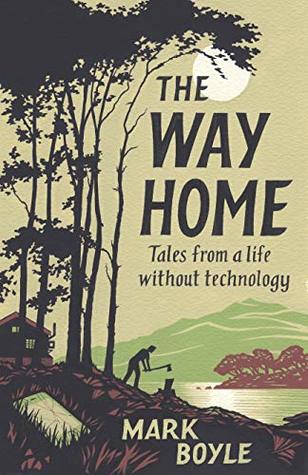
Mark Boyle’s previous experiment was to live without money for a year. He ended up living much longer than that, and it sent him down a path towards a new experiment: living without technology. The Way Home offers an intimate account of his life on a small farm in his native Ireland, where he chronicles his life without technology. Part Thoreau, part Gandhi, part Edward Abbey, this book is a wonderful journey that focuses not so much on the environmental destruction caused by modern culture, but on the effect that modern lifestyles have on us as people and on our relationship with the world. We know what is gained by technology, but what is lost?
If you like this book, you’ll also enjoy Mark Boyle’s 2011 TED talk about his relationship with money.
The Unlikely Peace at Cuchumaquic
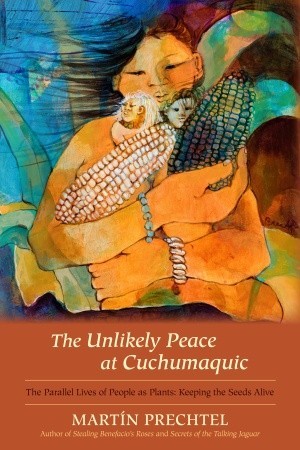
The Unlikely Peace at Cuchumaquic is like one of the seeds Martín Prechtel describes—preserving a way of thought so endangered in the modern world. From the perspective of those growing up in the Western worldview, we need a translator in order to go below the surface of indigenous thought. Prechtel is an excellent guide on that journey, and he asks that you follow him outside of what you might consider normal in order to see something more wondrous and complex. This book is part story, part elegy to a culture under siege, and part how-to guide to resist the homogenizing and dulling forces that consume indigenous and earth-based culture, all written in a long, flowing prose that sweeps you up and away into the story.
“Turn that worthless lawn into a beautiful garden of food whose seeds are stories sown, whose foods are living origins. Grow a garden on the flat roof of your apartment building, raise bees on the roof of your garage, grow onions in the iris bed, plant fruit and nut trees that bear, don’t plant ‘ornamentals’, and for God’s sake don’t complain about the ripe fruit staining your carpet and your driveway; rip out the carpet, trade food to someone who raises sheep for wool, learn to weave carpets that can be washed, tear out your driveway, plant the nine kinds of sacred berries of your ancestors, raise chickens and feed them from your garden, use your fruit in the grandest of ways, grow grapevines, make dolmas, wine, invite your fascist neighbors over to feast, get to know their ancestral grief that made them prefer a narrow mind, start gardening together, turn both your griefs into food; instead of converting them, convert their garage into a wine, root, honey, and cheese cellar–who knows, peace might break out, but if not you still have all that beautiful food to feed the rest and the sense of humor the Holy gave you to know you’re not worthless because you can feed both the people and the Holy with your two little able fists.”
Last Child in the Woods: Saving Our Children From Nature-Deficit Disorder
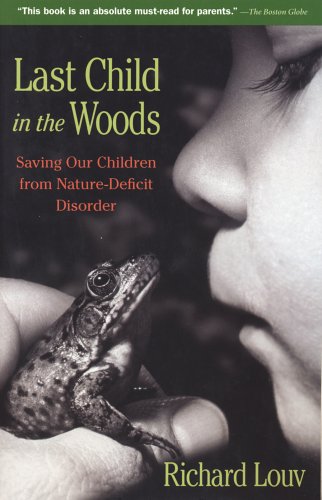
“We have such a brief opportunity to pass on to our children our love for this Earth, and to tell our stories. These are the moments when the world is made whole. In my children’s memories, the adventures we’ve had together in nature will always exist.”
“”I had a place. There was a big waterfall and a creek on one side of it. I’d dug a big hole there, and sometimes I’d take a tent back there, or a blanket, and just lie down in the hole, and look up at the trees and sky. Sometimes I’d fall asleep back there. I just felt free; it was like my place, and I could do what I wanted, with nobody to stop me. I used to go down there almost every day.’
The young poet’s face flushed. Her voice thickened.
‘And then they just cut the woods down. It was like they cut down part of me.’”
Written in 2006, this book was about the declining amount of time that our children spent in nature, and the impact it was having on their wellbeing. The most powerful part are the interviews with children about their relationships with the natural world.
It’s a poignant read in the age of the smartphone.
The Wayfinders
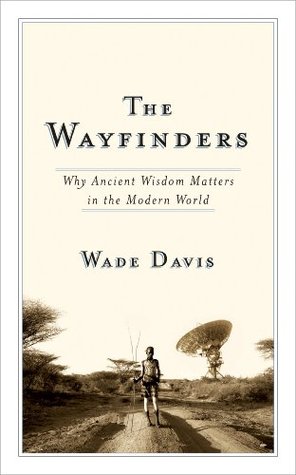
Wade Davis is an explorer of the human spirit and a champion for worldviews as an antidote to our present environmental decline. He takes us on a tour across the world, from the outstanding navigation of ancient Polynesians to the view of interconnectedness through the lens of Andean cultures. In seeking places for hope, for living alternatives to the consumerist and capitalist worldview, this is an excellent book to guide the first steps.
“If diversity is a source of wonder, its opposite – the ubiquitous condensation to some blandly amorphous and singularly generic modern culture that takes for granted an impoverished environment – is a source of dismay. There is, indeed, a fire burning over the earth, taking with it plants and animals, cultures, languages, ancient skills and visionary wisdom. Quelling this flame, and re-inventing the poetry of diversity is perhaps the most important challenge of our times.”
“The full measure of a culture embraces both the actions of a people and the quality of their aspirations, the nature of the metaphors that propel their lives. And no description of a people can be complete without reference to the character of their homeland, the ecological and geographical matrix in which they have determined to live out their destiny. Just as a landscape defines character, culture springs from a spirit of place.”
Open Veins of Latin America
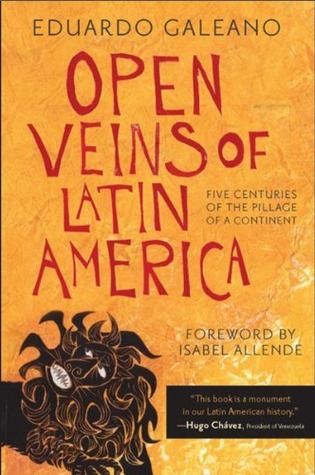
Open Veins of Latin America is a vivid exploration of colonial and neo-colonial history in all of Latin America. This book is a valid answer to the question, “how did the United States get so rich?” When we examine the origins of modern culture in the U.S., we rarely ask questions about where our consumer goods come from, who we stepped on to stand at the pinnacle of global power, or how Central Americans became refugees crossing our southern border. This book is about Latin American history, but it is also about the intentionally hidden histories of the United States.
“Our defeat was always implicit in the victory of others; our wealth has always generated our poverty by nourishing the prosperity of others – the empires and their native overseers. In the colonial and neocolonial alchemy, gold changes into scrap metal and food into poison.”
“Latin America is the region of open veins. Everything from the discovery until our times, has always been transmuted into European–or later–United States– capital, and as such has accumulated on distant centers of power. Everything: the soil, its fruits and its mineral-rich depths, the people and their capacity to work and to consume, natural resources and human resources.”
The More Beautiful World Our Hearts Know Is Possible
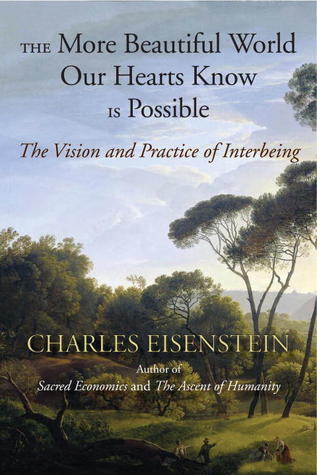
Read the book online for free here.
Charles Eisenstein tries beautifully to illuminate modern American culture for what it is: a ruthless game to maximize self-interest at the expense of those people, places, and parts of the natural world that are hidden to us or we choose to look away from. At the core is a proposition to create what he calls a “new story of the people”—a story to replace the story we tell ourselves about success and our purpose as a society.
Lies My Teacher Told Me
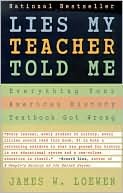
Why do we see our culture as exceptional? Why are we so reluctant to change even the most basic of our assumptions in the face of environmental catastrophe? James Loewen analyzes and compares the texts of the most popular 18 American history textbooks to ask whether this is really what we should be teaching our young people. The way we see our history is the way we see ourselves.
“Ironically, Adolf Hitler displayed more knowledge of how we treated Native Americans than American high schoolers today who rely on their textbooks. Hitler admired our concentration camps for American Indians in the west and according to John Toland, his biographer, “often praised to his inner circle the efficiency of America’s extermination—by starvation and uneven combat” as the model for his extermination of Jews and Gypsies (Rom people).”
“Consider a white ninth-grade student taking American history in a predominantly middle-class town in Vermont. Her father tapes Sheetrock, earning an income that in slow construction seasons leaves the family quite poor. Her mother helps out by driving a school bus part-time, in addition to taking care of her two younger siblings. The girl lives with her family in a small house, a winterized former summer cabin, while most of her classmates live in large suburban homes. How is this girl to understand her poverty? Since history textbooks present the American past as four hundred years of progress and portray our society as a land of opportunity in which folks get what they deserve and deserve what they get, the failures of working-class Americans to transcend their class origin inevitably get laid at their own doorsteps.”
The Protestant Ethic and the Spirit of Capitalism
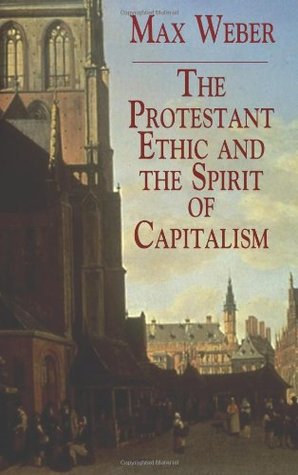
Max Weber was one of the original sociologists to see the disenchantment associated with the rise of capitalism. He pointed to the social and cultural roots of that phenomenon: a direct refute to Karl Marx’s ideas about class struggle and communism. When seeking the roots of the modern American culture and its associated damage to the natural world, Max Weber is an often overlooked stop on the path.
Eating Animals
Categories: Food
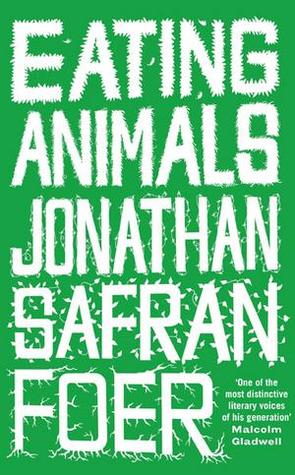
“Ironically, the utterly unselective omnivore — “I’m easy; I’ll eat anything” — can appear more socially sensitive than the individual who tries to eat in a way that is good for society.”
“Isn’t it strange how upset people get about a few dozen baseball players taking growth hormones, when we’re doing what were doing to our food animals and feeding them to our children?”
“If we were to one day encounter a form of life more powerful and intelligent than our own, and it regarded us as we regard fish, what would be our argument against being eaten?”
Foer is better known for his novels-turned-movies Everything is Illuminated and Extremely Loud and Incredibly Close. This book is part memoir, part investigative journalism, diving deeply into the scientific, cultural, moral, and philosophical questions raised when we eat animals.
Everything I Want To Do Is Illegal
Categories: Food
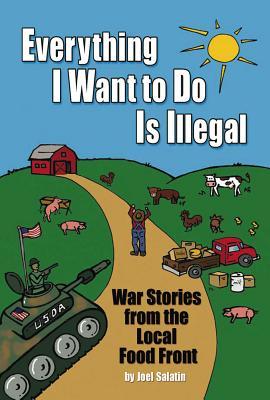
“How much evil throughout history could have been avoided had people exercised their moral acuity with convictional courage and said to the powers that be, ‘No, I will not. This is wrong, and I don’t care if you fire me, shoot me, pass me over for promotion, or call my mother, I will not participate in this unsavory activity.’ Wouldn’t world history be rewritten if just a few people had actually acted like individual free agents rather than mindless lemmings?”
“A farm includes the passion of the farmer’s heart, the interest of the farm’s customers, the biological activity in the soil, the pleasantness of the air about the farm — it’s everything touching, emanating from, and supplying that piece of landscape. A farm is virtually a living organism.”
Salatin, featured prominently in Pollan’s The Omnivore’s Dilemma is an organic farmer using innovative techniques to raise animals more sustainably. He is well-known as one of the leading figures in the world of sustainable food production.
Fast Food Nation
Categories: Food
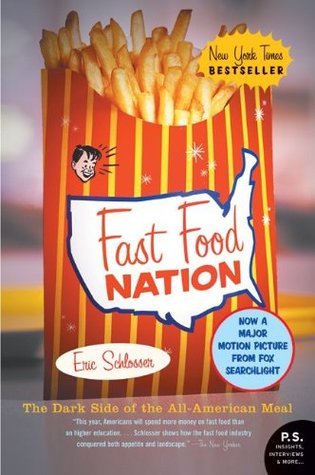
The first and most thorough exposé of America’s fast food industry, touching on health, the environment, corporate greed, and the evolution of consumerism.
“The history of the twentieth century was dominated by the struggle against totalitarian systems of state power. The twenty-first will no doubt be marked by a struggle to curtail excessive corporate power.”
The Revolution Will Not Be Microwaved
Categories: Food

“Laws dictating food standards are driven by the model of mass production, where sterility and uniformity are everything, rendering much of the trade in local food technically illegal. Eating well has become an act of civil disobedience.”
Katz profiles small-scale underground food producers who are challenging processed and industrial food on their own terms.
Silent Spring
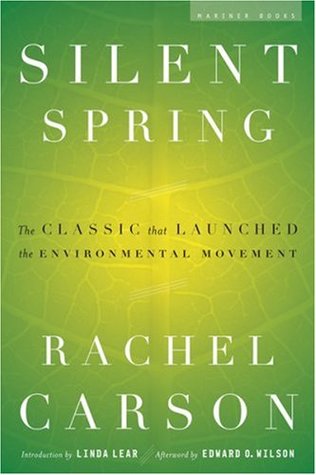
“Why should we tolerate a diet of weak poisons, a home in insipid surroundings, a circle of acquaintances who are not quite our enemies, the noise of motors with just enough relief to prevent insanity? Who would want to live in a world which is just not quite fatal?”
“We stand now where two roads diverge. But unlike the roads in Robert Frost’s familiar poem, they are not equally fair. The road we have long been traveling is deceptively easy, a smooth superhighway on which we progress with great speed, but at its end lies disaster. The other fork of the road — the one less traveled by — offers our last, our only chance to reach a destination that assures the preservation of the earth.”
This is the book that launched the environmental movement in the United States. Rachel Carson addressed the world about the growing crisis of pesticide pollution (specifically DDT). DDT was thinning the eggshells of predatory birds, killing all the chicks. The silence that the title refers to is a world without birds. We owe so much of our understanding about the environment to Rachel Carson and to this book.
The Burning Season: The Murder of Chico Mendes and the Fight for the Amazon Rain Forest
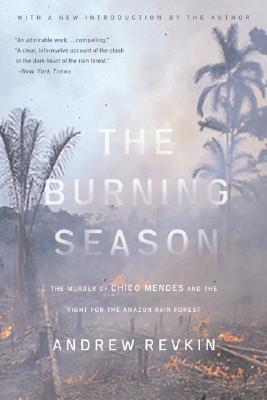
“It became clear that the murder was a microcosm of the larger crime: the unbridled destruction of the last great reservoir of biological diversity on Earth.”
Chico Mendes was a rubber tapper in the Brazilian state of Acre in the remote Amazon Basin. He became a community organizer and successful environmental activist, advocating for reserves of forest where rubber could be grown in agro-forestry practices. He was murdered for his audacity to stand up against the largest forces on earth to ask for the preservation of the Amazon.
Wisdom Sits In Places
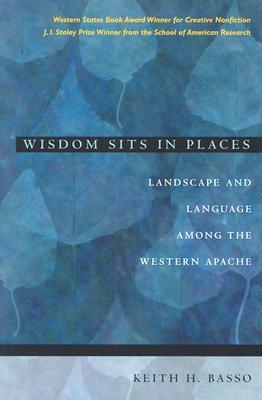
“one must acknowledge that local understandings of external realities are fashioned from local cultural materials, and that, knowing little or nothing of the latter, one’s ability to make appropriate sense of “what is” and “what occurs” in another’s environment is bound to be deficient.”
“You can’t live long without water and you can’t live a long time without wisdom. You need to drink both.”
Basso follows the relationship of four Apache people to the land where they live, illuminating what it means to be at home in a specific place in the world: the opposite of an extraction-based culture and economy.
The Final Forest: The Battle for the Last Great Trees of the Pacific Northwest
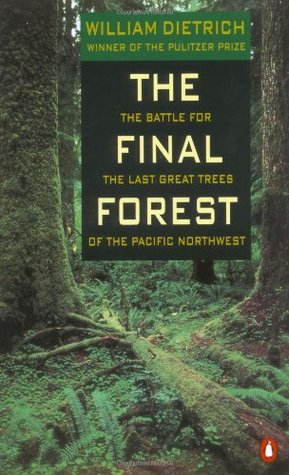
The old-growth trees of America’s Pacific Northwest are the largest in the world. To walk in those forests leaves you speechless at the scale of the natural world. Yet, over 90% of those forests have already been destroyed by logging. This is the story of logging and extraction in those forests, the people who earn their living from the land, the people who spent their lives fighting to save the forests, and the spotted owl that was at the center of the legal decision that brought down the logging industry in the early 1990’s. We hear from remarkably different perspectives about how they want to live in a landscape that they all love.
Green Is The New Red
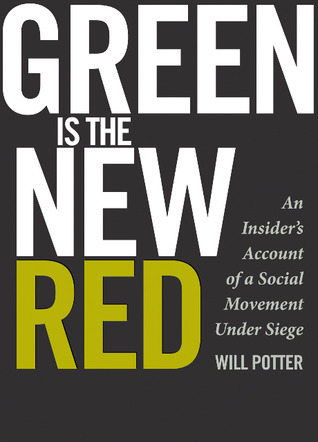
“At a time when it seems that everyone is going green, most people are unaware that the FBI is using anti-terrorism resources to target environmentalists and animal rights activists.”
Will Potter, an award-winning journalist, links corruption, corporate agendas, and the growing trend to label environmental activism as terrorism in post-9/11 America. His message is terrifying: large corporations have successfully lobbied to use anti-terrorism laws against environmentalists because activism harms their profits and can legally be defined as terrorism. This is the story of FBI agents infiltrating vegan potlucks and a story of citizens on watchlists for distributing pamphlets. Potters asks, who has the power in this country and how can ordinary citizens maintain their voice?
Collapse

What happens when a society outstrips its natural resources? Jared Diamond, legendary author of Guns, Germs, and Steel, takes a sweeping tour of the world to visit the societies that have collapsed in the distant past from Chaco Canyon to Easter Island to Greenland, and into recent times with the Rwandan genocide. He then analyzes our current state of resource overconsumption in a globalized world. As always, Diamond is incredibly detailed, with insights that cut through the fog of confusion that surrounds our modern predicament.
“Two types of choices seem to me to have been crucial in tipping the outcomes [of the various societies’ histories] towards success or failure: long-term planning and willingness to reconsider core values. On reflection we can also recognize the crucial role of these same two choices for the outcomes of our individual lives.”
“I have often asked myself, “What did the Easter Islander who cut down the last palm tree say while he was doing it?” Like modern loggers, did he shout “Jobs, not trees!”? Or: “Technology will solve our problems, never fear, we’ll find a substitute for wood”? Or: “We don’t have proof that there aren’t palms somewhere else on Easter, we need more research, your proposed ban on logging is premature and driven by fear-mongering”? Similar questions arise for every society that has inadvertently damaged its environment.”
Small Is Beautiful: Economics As If People Mattered
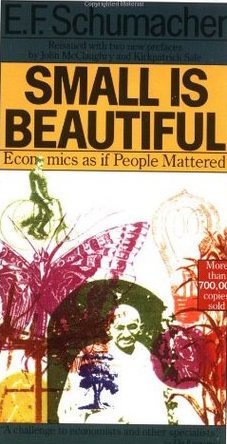
This classic asks a simple question: does our modern economy function in the interest of the average person? The obvious answer is that it does not. Schumacher outlines solutions and different ways of thinking about economics. This book is an antidote to the neoliberal economic policies of the world that have dominated since the time of Reagan and Thatcher, causing untold environmental and cultural destruction.
“Fossil fuels are merely a part of the “natural capital” which we steadfastly insist on treating as expendable, as if it were income, and by no means the most important part. If we squander our fossil fuels, we threaten civilisation; but if we squander the capital represented by living nature around us, we threaten life itself.”
The Limits To Growth
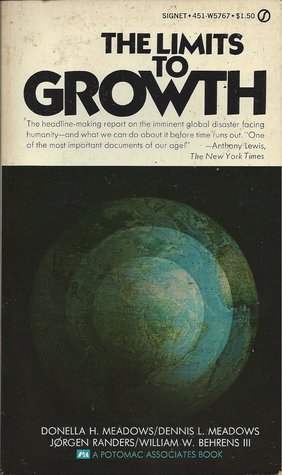
The message of this book still holds today: The earth’s interlocking resources – the global system of nature in which we all live – probably cannot support present rates of economic and population growth much beyond the year 2100, if that long, even with advanced technology. In the summer of 1970, an international team of researchers at the Massachusetts Institute of Technology began a study of the implications of continued worldwide growth. They examined the five basic factors that determine and, in their interactions, ultimately limit growth on this planet-population increase, agricultural production, nonrenewable resource depletion, industrial output, and pollution generation. The MIT team fed data on these five factors into a global computer model and then tested the behavior of the model under several sets of assumptions to determine alternative patterns for mankind’s future. The Limits to Growth is the nontechnical report of their findings. The book contains a message of hope, as well: Humans can create a society in which we can live indefinitely on earth if we impose limits on ourselves and our production of material goods to achieve a state of global equilibrium with population and production in carefully selected balance.
You can download a PDF version of The Limits To Growth from the main author’s website here.
“There are “50 simple things you can do to save the planet.” Buy an energy-efficient car, for one. Recycle your bottles and cans, vote knowledgeably in elections—if you are among those people in the world blessed with cars, bottles, cans, or elections. There are also not-so-simple things to do: Work out your own frugally elegant lifestyle, have at most two children, argue for higher prices on fossil energy (to encourage energy efficiency and stimulate development of renewable energy), work with love and partnership to help one family lift itself out of poverty, find your own “right livelihood,” care well for one piece of land, do whatever you can to oppose systems that oppress people or abuse the earth, run for election yourself.”
“People don’t need enormous cars; they need admiration and respect. They don’t need a constant stream of new clothes; they need to feel that others consider them to be attractive, and they need excitement and variety and beauty. People don’t need electronic entertainment; they need something interesting to occupy their minds and emotions. And so forth. Trying to fill real but nonmaterial needs-for identity, community, self-esteem, challenge, love, joy-with material things is to set up an unquenchable appetite for false solutions to never-satisfied longings. A society that allows itself to admit and articulate its nonmaterial human needs, and to find nonmaterial ways to satisfy them, world require much lower material and energy throughputs and would provide much higher levels of human fulfillment.”
Lifting Hearts Off The Ground
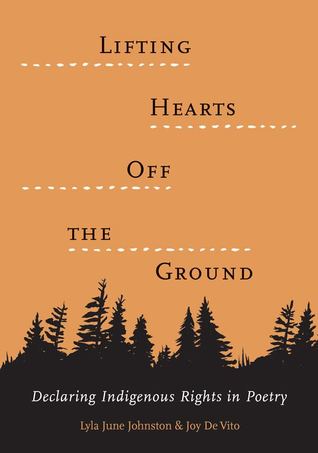
An indigenous poet and a settler poet examine the United Nations Declaration on the Rights of Indigenous Peoples and help it to become beautiful by bringing it into poetry.
Encounters With The Archdruid
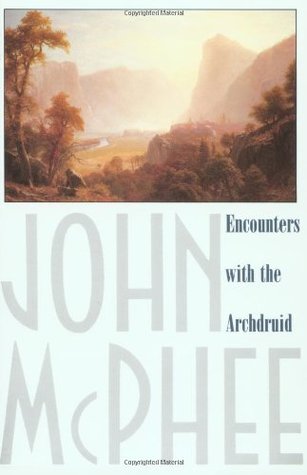
“Sooner or later in every talk, Brower describes the creation of the world. He invites his listeners to consider the six days of Genesis as a figure of speech for what has in fact been four billion years. On this scale, a day equals something like six hundred and sixty-six million years, and thus ‘all day Monday and until Tuesday noon, creation was busy getting the earth going.’ Life began Tuesday noon, and ‘the beautiful, organic wholeness of it’ developed over the next four days. ‘At 4 P.M. Saturday, the big reptiles came on. Five hours later, when the redwoods appeared, there were no more big reptiles. At three minutes before midnight, man appeared. At one-fourth of a second before midnight, Christ arrived. At one-fortieth of a second before midnight, the Industrial Revolution began. We are surrounded with people who think that what we have been doing for the last one-fortieth of a second can go on indefinitely. They are considered normal, but they are stark, raving mad.”
David Brower was a giant in environmental protection in the United States. As president of the Sierra Club, he grew the organization from a small mountaineering club to the largest environmental lobbying group in the world: over 3.5 million members. Many credit Brower for the preservation of the Grand Canyon and the North Cascades. In this book, John McPhee follows Brower for three encounters with his rivals: a mining geologist, a real estate developer, and a dam builder.
Let My People Go Surfing
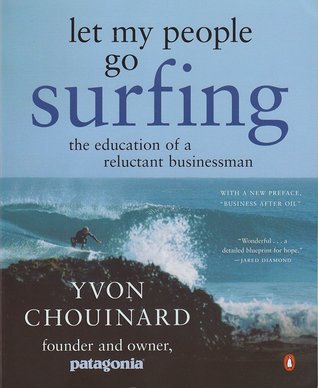
“The more you know, the less you need.”
“A master in the art of living draws no sharp distinction between his work and his play; his labor and his leisure; his mind and his body; his education and his recreation. He hardly knows which is which. He simply pursues his vision of excellence through whatever he is doing, and leaves others to determine whether he is working or playing. To himself, he always appears to be doing both.”
Yvon Chouinard is a legendary figure in the world of wilderness activities in the US. He invented a lot of modern rock climbing and mountaineering equipment, and funnels millions of dollars from his companies into environmental activism and protection. This is his book on business: how he went from being a climber forging carabiners in the back of his van in Yosemite Valley to founding the biggest companies producing equipment for the outdoors.
The One-Straw Revolution
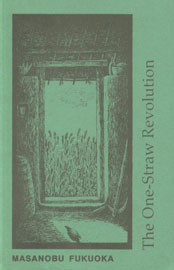
“Human beings are the only animals who have to work, and I think that is the most ridiculous thing in the world. Other animals make their livings by living, but people work like crazy, thinking that they have to in order to stay alive. The bigger the job, the greater the challenge, the more wonderful they think it is. It would be good to give up that way of thinking and live an easy, comfortable life with plenty of free time. I think that the way animals live in the tropics, stepping outside in the morning and evening to see if there is something to eat, and taking a long nap in the afternoon, must be a wonderful life. For human beings, a life of such simplicity would be possible if one worked to produce directly his daily necessities. In such a life, work is not work as people generally think of it, but simply doing what needs to be done.”
“When it is understood that one loses joy and happiness in the attempt to possess them, the essence of natural farming will be realized. The ultimate goal of farming is not the growing of crops, but the cultivation and perfection of human beings.”
Fukuoka is hailed across the world as a master in organic agriculture. His methods of “do-nothing farming” have inspired many, and his questions undermine all assumptions about what it takes to feed ourselves in the industrial age. Part Zen treatise, part memoir, part farming guide, this book is a classic, and a must-read for anybody who grows their own food (which should be everybody).
Braiding Sweetgrass

“On Mondays, Wednesdays, and Fridays at 9:35 a.m., I am usually in a lecture hall at the university, expounding about botany and ecology—trying, in short, to explain to my students how Skywoman’s gardens, known by some as “global ecosystems,” function. One otherwise unremarkable morning I gave the students in my General Ecology class a survey. Among other things, they were asked to rate their understanding of the negative interactions between humans and the environment. Nearly every one of the two hundred students said confidently that humans and nature are a bad mix. These were third-year students who had selected a career in environmental protection, so the response was, in a way, not very surprising. They were well schooled in the mechanics of climate change, toxins in the land and water, and the crisis of habitat loss. Later in the survey, they were asked to rate their knowledge of positive interactions between people and land. The median response was “none.”
I was stunned. How is it possible that in twenty years of education they cannot think of any beneficial relationships between people and the environment? Perhaps the negative examples they see every day— brownfields, factory farms, suburban sprawl—truncated their ability to see some good between humans and the earth. As the land becomes impoverished, so too does the scope of their vision.”
Braiding Sweetgrass is a beautiful journey through our personal and cultural relationships with the natural world. Robin Wall Kimmerer writes from the dual perspectives of a Native American woman and an ecology professor, outlining the intersection between science and traditional ways of knowing the Earth. She writes to share a vision—how we can begin to form beneficial relationships with the natural world and move beyond a model of damage control.
Garbage Land
Categories: Waste
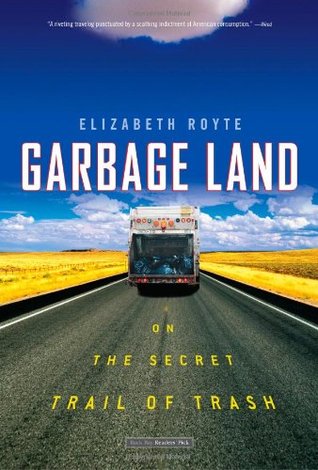
Elizabeth Royte tracks down all the components of New York City’s waste from trash and recycling to Christmas trees and sewage. She winds up deep in the complex and not-so-savory world of the United States waste disposal. Learn the truths about plastic “recycling,” sewage treatment, and the ever-growing problem of where to put the ever-growing mountain of stuff we throw “away.”
The Man Who Planted Trees
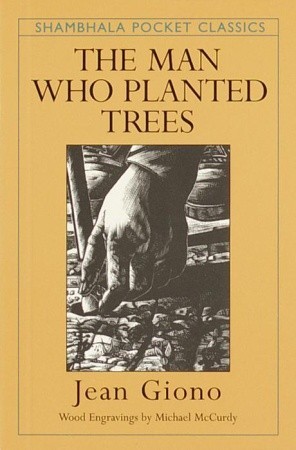
“The oaks of 1910 were then ten years old and taller than either of us. It was an impressive spectacle. I was literally speechless and, as he did not talk, we spent, the whole day walking in silence through his forest. In three sections, it measured eleven kilometers in length and three kilometers at its greatest width. When you remembered that all this had sprung from the hands and the soul of this one man, without technical resources, you understand that men could be as effectual as God in other realms than that of destruction.”
This gem is among our favorite stories: a simple allegory about the efforts of one man to change the world around him. It’s wonderfully written and just a fifteen minute read. This version, the story read aloud over an animated illustration, won an academy award for short films in 1987, and we highly recommend it. You can find Jeff’s transcription of this version here.
The Unsettling of America
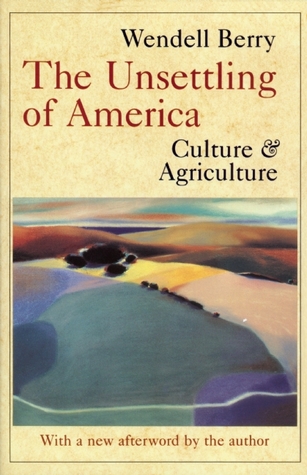
“We have given up the understanding — dropped it out of our language and so out of our thought — that we and our country create one another, depend on one another, are literally part of one another; that our land passes in and out of our bodies just as our bodies pass in and out of our land; that as we and our land are part of one another, so all who are living as neighbors here, human and plant and animal, are part of one another, and so cannot possibly flourish alone; that, therefore, our culture must be our response to our place, our culture and our place are images of each other and inseparable from each other, and so neither can be better than they other.”
Wendell Berry is a farmer and poet, outraged at what is happening with the spread of industrial agriculture. He details how our connection to the land is the definition of our culture, and how our industrial culture is killing both itself and the planet. If you read just one book about food, this should be it. Written over 50 years ago, Berry’s insight is still urgent and could have been written yesterday.
Junkyard Planet: Travels in the Billion-Dollar Trash Trade
Categories: Waste
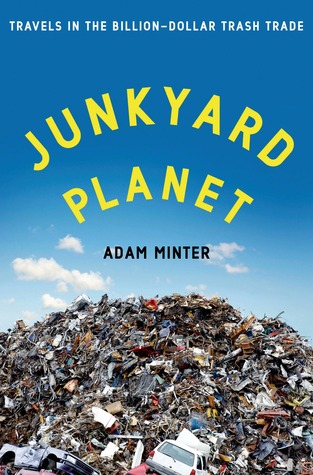
“Placing a box or a can or a bottle in a recycling bin doesn’t mean you’ve recycled anything, and it doesn’t make you a better, greener person: it just means you’ve outsourced your problem. Fortunately, if that realization leaves you feeling bad, there’s always the alternative: stop buying so much crap in the first place.”
Written by a junkyard-owner’s son, this is an exposé of the global trade in scrap material. From American scrap dealers to a Christmas tree light recycling factory in China (yes, there are factories that work exclusively with Christmas lights), Minter shows us what recycling looks like in practice. It’s not always pretty, not always safe, and not always good for the world.
The Omnivore’s Dilemma
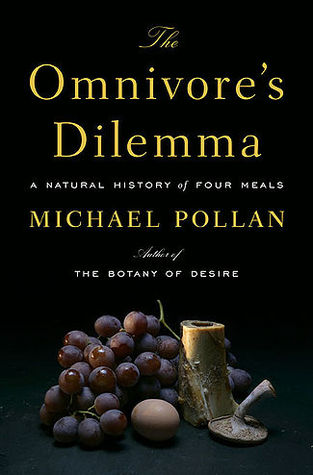
“Imagine if we had a food system that actually produced wholesome food. Imagine if it produced that food in a way that restored the land. Imagine if we could eat every meal knowing these few simple things: What it is we’re eating. Where it came from. How it found its way to our table. And what it really cost.”
This is our modern classic book on the food we eat. Pollan picks apart America’s food system, examining the true impact of industrial agriculture (focusing on corn), what large and small-scale organic farming looks like, and asking if any real alternatives exist. It’s fun, it’s accessible, and it’s deep.
The Last American Man
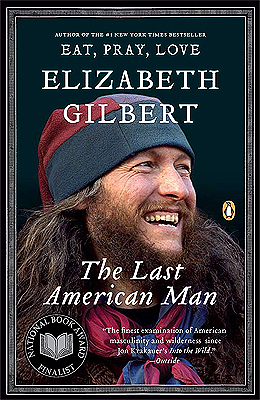
“Only those who live in the wilderness can recognize the central truth of existence, which is that death lives right beside us at all times, as close and as relevant as life itself, and that this reality is nothing to fear but is a sacred truth to be praised.”
“Show up for your own life, he said. Don’t pass your days in a stupor, content to swallow whatever watery ideas modern society may bottle-feed you through the media, satisfied to slumber through life in an instant-gratification sugar coma. The most extraordinary gift you’ve been given is your own humanity, which is about consciousness, so honor that consciousness.
Revere your senses; don’t degrade them with drugs, with depression, with willful oblivion. Try to notice something new everyday, Eustace said. Pay attention to even the most modest of daily details. Even if you’re not in the woods, be aware at all times. Notice what food tastes like; notice what the detergent aisle in the supermarket smells like and recognize what those hard chemical smells do to your senses; notice what bare feet fell like; pay attention every day to the vital insights that mindfulness can bring. And take care of all things, of every single thing there is – your body, your intellect, your spirit, your neighbors, and this planet. Don’t pollute your soul with apathy or spoil your health with junk food any more than you would deliberately contaminate a clean river with industrial sludge.”
Tropic of Chaos: Climate Change and the New Geography of Violence
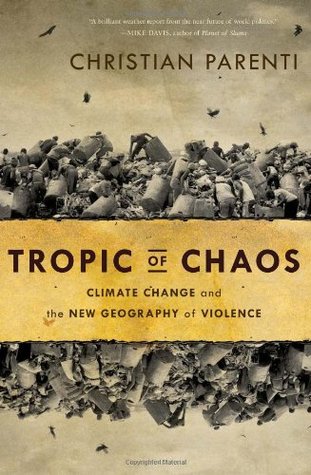
“In a world that sees two meter sea level rise, with continued flooding ahead, it will take extraordinary effort for the United States, or indeed any country, to look beyond its own salvation. All of the ways in which human beings have dealt with natural disasters in the past . . . could come together in one conflagration: rage at government’s inability to deal with the abrupt and unpredictable crises; religious fervor, perhaps even a dramatic rise in millennial end-of-days cults; hostility and violence toward migrants and minority groups, at a time of demographic change and increased global migration; and intra- and interstate conflict over resources, particularly food and fresh water.”
Greenhouse Gangsters vs Climate Justice

Read here
“The severity and planetwide nature of climate change represents a sort of an endgame for the global oil corporations. It sets up a showdown between the Greenhouse Gangsters whose activities are at the heart of the global warming crisis, and Climate Justice. The gathering forces of Climate Justice can be broadly defined as the interests of the vast majority of the world’s people and that of the ecological stability of the Earth. . .Climate Justice integrally links human rights and ecological sustainability, recognizing that the communities fighting to live free of the environmental and social problems created by big oil are also on the front lines in the battle against climate change.”
A concise briefing (it comes to 32 pages) on “Greenhouse gangsters”: the oil industry and other corporations which are threatening planetary health through harmful actions and ineffective responses, and the goals and proposed solutions of the Climate Justice movement to halt those actions and respond effectively to the climate crisis.
Contours of Climate Justice: Ideas for Shaping New Climate and Energy Politics
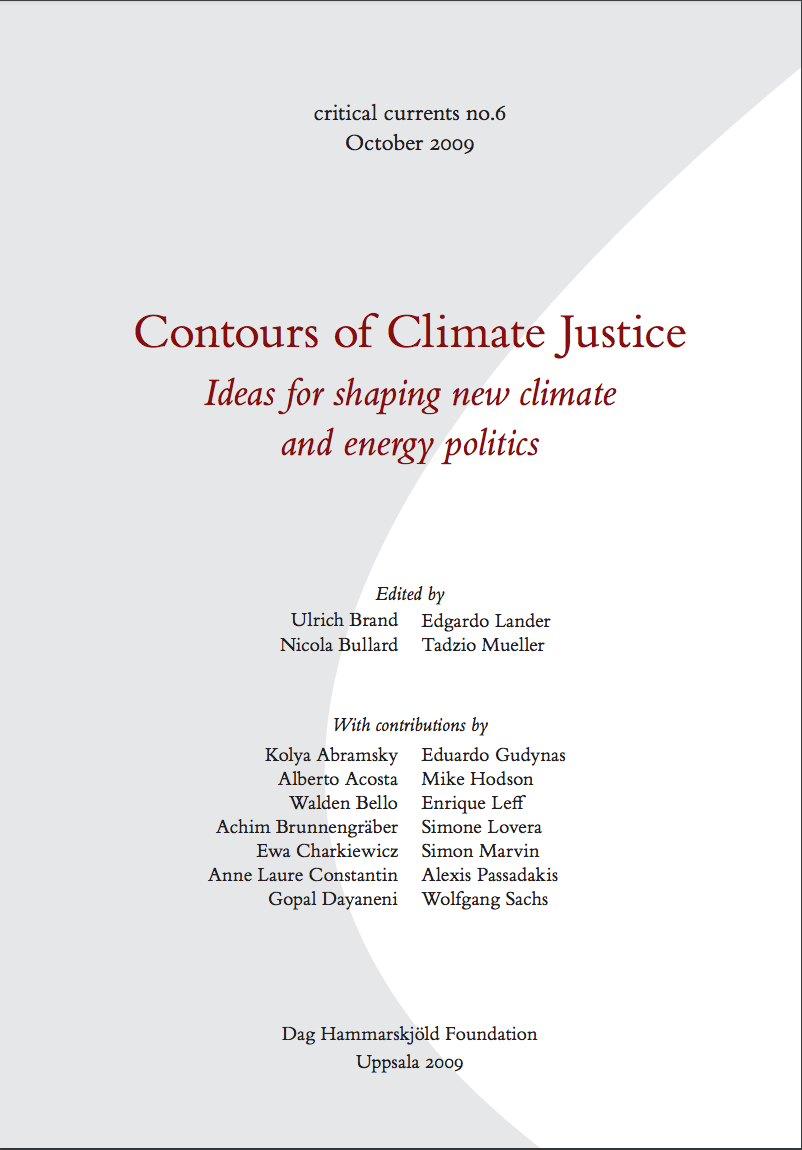
Read here
“There is something uncanny about the politics of climate change. An issue at the same time old and new; omnipresent, yet easily forgotten; threatening the destruction of billions of lives, yet somehow relegated to a relatively obscure corner of the global political system, the United Nations Framework Convention on Climate Change (UNFCCC), a treaty organisation far less powerful than, say, the World Trade Organization (WTO).”
A collection of essays from a variety of authors working internationally that investigate and illuminate the climate crisis in three parts: first, the policies, actions, and mindsets that led to the crisis; second, the “wrong turns, dead-ends and cross-roads” offered by potential solutions and policies; and third, the landscape of the current climate justice movement as it fights towards a sustainable future.
Politics of Climate Justice: Paralysis Above, Movement Below
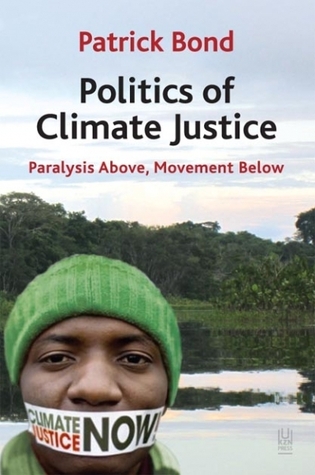
Read Here
“There is no way around it: to solve the worsening climate crisis requires we must accept both that the vast majority of fossil fuels must now be left underground, and that through democratic planning, we must collectively reboot our energy, transport, agricultural, production, consumption and disposal systems so that by 2050 we experience good living – the Bolivian ‘buen vivir’ including ‘Rights of Nature’ – with less than a quarter of our current levels of greenhouse gas emissions.”
With Speed and Violence: Why Scientists Fear Tipping Points in Climate Change
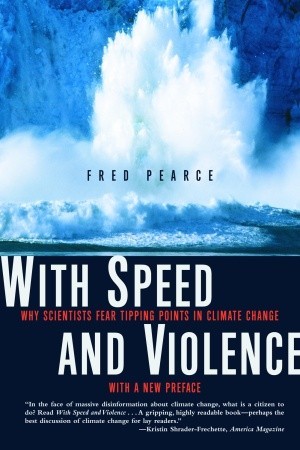
“Nature is fragile, environmentalists often tell us. But the lesson of this book is that it is not so. The truth is far more worrying. Nature is strong and packs a serious counterpunch . . . Global warming will very probably unleash unstoppable planetary forces. And they will not be gradual. The history of our planet’s climate shows that it does not do gradual change. Under pressure, whether from sunspots or orbital wobbles or the depredations of humans, it lurches—virtually overnight.”
The End of Nature
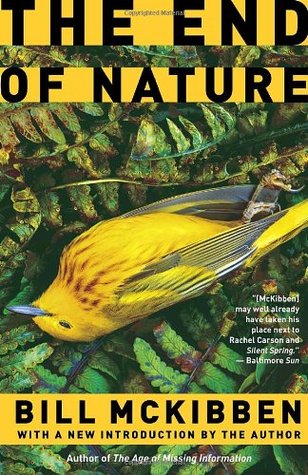
“The chief lesson is that the world displays a lovely order, an order comforting in its intricacy. And the most appealing part of this harmony, perhaps, is its permanence – the sense that we are part of something with roots stretching back nearly forever, and branches reaching forward just as far. Purely human life provides only a partial fulfillment of this desire for a kind of immortality.”
Reissued in 2006 with a new introduction by the author.
Eaarth: Making Life on a Tough New Planet
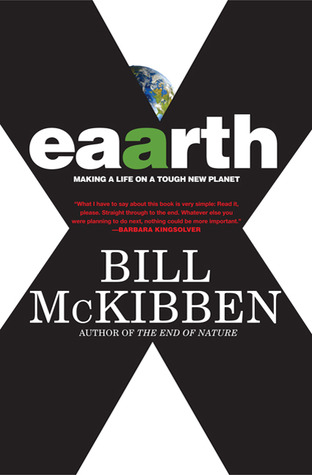
“Imagine we live on a planet. Not our cozy, taken-for-granted earth, but a planet, a real one, with dark poles and belching volcanoes and a heaving, corrosive sea, raked by winds, strafed by storms, scorched by heat. An inhospitable place. A different place. A different planet. It needs a new name: eaarth.”
McKibben paints a picture of what life will look like on an earth that’s undergoing the worst of climate change effects, a planet so altered from what we know now it might as well be a different planet: “Eaarth.” How will we repair our civilizations and protect ourselves from Eaarth—let alone drum up the money for such repairs and protections—when our economic system and its growth depend on the exhausted and degraded resources of a bygone Earth? McKibben argues for organizing in scaled-down decentralized communities (aka “Think Local”) that will be able to weather the storms we’ve made Eaarth throws at us. Eaarth’s solutions are focused more on how to cope with and mitigate the apocalypse than on averting it.
This Changes Everything: Capitalism vs. The Climate
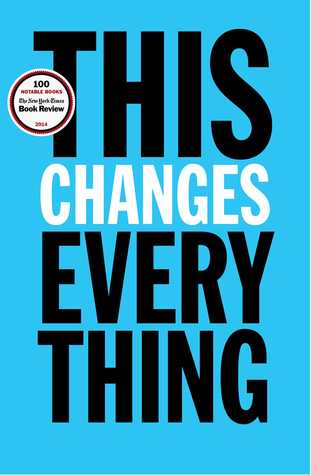
“What the climate needs to avoid collapse is a contraction in humanity’s use of resources; what our economic model demands to avoid collapse is unfettered expansion. Only one of these sets of rules can be changed, and it’s not the laws of nature.”
“Slavery wasn’t a crisis for British and American elites until abolitionism turned it into one. Racial discrimination wasn’t a crisis until the civil rights movement turned it into one. Sex discrimination wasn’t a crisis until feminism turned it into one. Apartheid wasn’t a crisis until the anti-apartheid movement turned it into one. In the very same way, if enough of us stop looking away and decide that climate change is a crisis worthy of Marshall Plan levels of response, then it will become one, and the political class will have to respond, both by making resources available and by bending the free market rules that have proven so pliable when elite interests are in peril.”
Why do we continue to “look away” from climate change, unable to acknowledge it as the crisis it truly is? Because the ideology and system of capitalism and its proponents—more specifically free-market fundamentalism aka neoliberalism—have systematically overpowered or silenced effective response. Its core policies of privatization, corporate deregulation, and lower corporate taxation are directly opposed to the policies needed to lower fossil fuel combustion. Addressing the climate crisis will call for tremendous economic and social change, not the false solutions offered by those same “disaster capitalists” (see her book The Shock Doctrine for more on this) who exploit social, economic, and now environmental upheavals to make themselves richer, or by geoengineers who assume the world is our resource to be used and manipulated without reciprocal stewardship or consequences. Importantly, though this crisis is urgent and disastrous, it’s also exciting and inspiring: this is a chance to create a society and economy that’s more equitable and compassionate, and the climate justice movement has already won several battles that are paving the way there. A book that will change the way you think about the reasons behind climate change and effective action going forward. (Also a documentary!)
Dead Pool: Lake Powell, Global Warming, and the Future of Water in the West
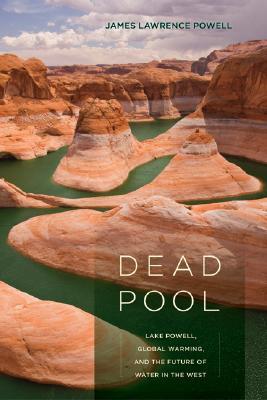
“…In only seventeen years, two major and opposite crises on the Colorado River threatened the Southwest. First came the flood, then came the drought. Both caught even the experts by surprise, revealing that in deciding to store twenty trillion gallons of Colorado River water behind concrete arch dams, then allowing a civilization to become dependent on that water, we did not know what we were doing. We gambled and got away with it—for now. But Nature is an implacable opponent, with unlimited time and energy. Keep rolling the dice with her, and eventually you will lose.”
Powell investigates the past, present, and future of American Southwest Anglo settlement through the lens of dams, using the Lake Powell reservoir straddling Arizona and Utah as a case study. He explains how the interests of the Bureau of Reclamation, developers, and landowners influenced the building of the dams got us to where we are today: huge desert agro-industrial farms sucking up a majority of the water and supercities like LA, Las Vegas, and Phoenix guzzling the rest, while reservoirs threaten to drop to “dead pool” levels: so low they can’t even spin the turbines used to generate hydroelectricity. A cautionary tale about water management and bribe-induced governmental decision-making.
The Great Thirst: Californians and Water: A History
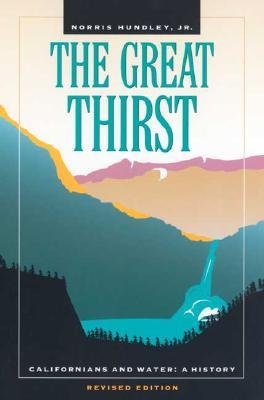
“[The Spanish and Mexican] attitude toward water changed after the discovery of gold, when thousands poured into California imbued with a spirited individualism and an appetite for a profit that elevated the exploitation of nature to new heights, set the stage for a system of private monopolization of land and water that has persisted into modern times, transformed political and legal institutions, and prompted California’s emergence as the nation’s preeminent water seeker—or, to be more precise and as emphasized in this account, California’s emergence as a collection of water seekers.”
Hundley untangles the dense, confusing knot of California’s water propertization, regulatory systems, and their underlying values to form a coherent, comprehensive history (1770’s-1990’s) tracing the management and use of water by, and accompanying interests of, aboriginal Americans, hispanic settlers, Gold Rush settlers, and contemporary “water seekers.” From the publisher: “The desire to use, profit from, manipulate, and control water drives the people and events in this fascinating narrative until, by the end of the twentieth century, a large, colorful cast of characters and communities has wheeled and dealed, built, diverted, and connived its way to an entirely different statewide waterscape.”
A River Lost: The Life and Death of the Columbia
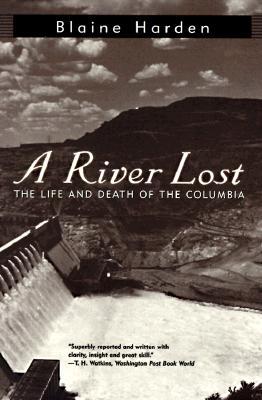
“This book is about the destruction of the great river of the West by well-intentioned Americans whose lives embodied a pernicious contradiction. They prided themselves on self-reliance, yet depended on subsidies. They distrusted the federal government, yet allowed it to do as it pleased with the river and the land through which it flowed. As long as there was federal money, they did not mind that farmers wasted water, that dams pushed salmon to extinction, or that plutonium workers recklessly spilled radioactive gunk beside the river…..My story of the river is a memoir, a history, and a lament for a splendid corner of the American West that maimed itself for the sake of prosperity and that continues not to understand why.”
The Columbia river in the American West has been dammed and polluted to death, reduced to a piece of computer-controlled power-generating machinery, while the people and animals that lived off and in it were denied access or decimated. All that’s left of the Columbia is “puddled remains,” history, and memories, which Harden recounts as he travels along the scene, and victim, of crime. Harden laments not only both the death of the wild river but also the death of the conscience of the American public, who did not hold federal government and farming, electricity, shipping, timber, and nuclear industries accountable for exploiting the Columbia. It’s noteworthy that Harden does a great job talking to people with various interests and stakes in the Columbia and understanding where they (or their industry) is coming from, thus avoiding dehumanizing them or perpetuating a battleground narrative.
Mayordomo: Chronicle of an Acequia in Northern New Mexico
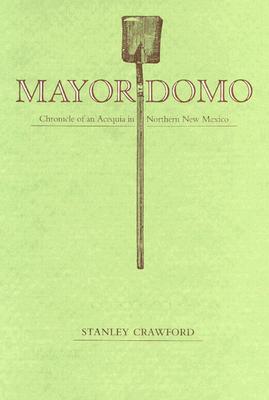
“No, by becoming mayordomo you do not become the Man, even if you are a gringo. You become something quite opposite. You become even more involved and entwined. Next to blood relationships, which rule the valley, come water relationships. The arteries of ditches and bloodlines cut across each other in patterns of astounding complexity…You can argue that the character of a man or woman can be as much formed by genetic and cultural material as by the location of their garden or chile patch along the length of a ditch, toward the beginning where water is plentiful or at the tail end where it will always be fitful and scarce.”
Crawford recounts his experiences in the role of a mayordomo, who is responsible for overseeing the maintenance and fair use of the acequia, a community-run canal/irrigation ditch that is the lifeline of his community’s agricultural livelihood in northern New Mexico. Crawford aims for depth, not breadth, documenting the slow, dry rhythms of farming life in a hispanic community managing their water by traditional Spanish law and how such management ties the community closer together.
Water Wars: Drought, Flood, and the Politics of Thirst
Categories: Water
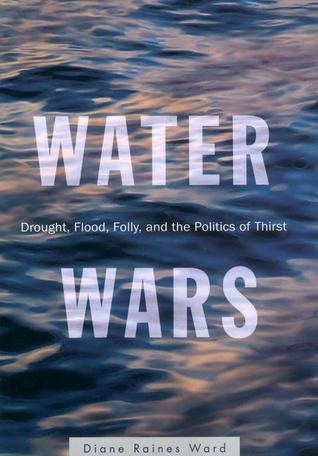
“Right now a gallon of drinking water in my city costs more than a gallon of gas.”
“Our whole society was built on the notion that we could and must control nature, that we must master our circumstances, technologically,” environmentalist Roland Clement said to me not long ago. “But natural systems are the consequence of a long evolution, and ecology is teaching us that we must first understand these systems to see how far we may modify them for our benefit without disastrous consequences. This is a new point of view that arose with ecological science, that world systems have a functional reality of their own and that if we push them too far, the systems will either break down or backfire.”
Using case studies of water issues in the Fertile Crescent to the coasts of the Netherlands to Bangladesh and various other flashpoints across the world, Ward helps readers understand the forces that have brought us to the brink of a global water supply crisis and what solutions have been and are being carried out presently (both successful and non-) to prevent future water wars.
Bottlemania: Big Business, Local Springs, and the Battle Over America’s Drinking Water
Categories: Water
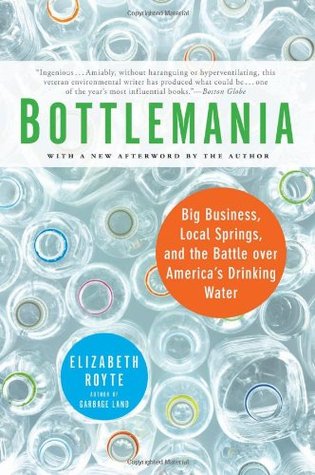
“[The water] filtering process mimics, in a supercondensed time frame, the purifying processes of nature. It’s the same ecosystem service provided for free in such places as Fryeburg, Maine, by glacier-made beds of sand and gravel.”
“If we believe water is a basic human right—such as freedom from persecution or equality before the law—then why would we let anyone slap a bar code on it?”
Royte uncovers the hidden machinery of economics, cultural trends, industries, and people behind one of today’s largest commercial phenomena: bottled water. She investigates how and why water became a saleable commodity in America and the implications of the industry’s waste.
Cadillac Desert: The American West and Its Disappearing Water
Categories: Water
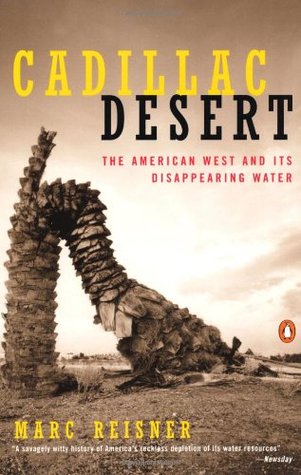
“In the West, it is said, water flows uphill toward money. And it literally does, as it leaps three thousand feet across the Tehachapi Mountains in gigantic siphons to slake the thirst of Los Angeles, as it is shoved a thousand feet out of Colorado River canyons to water Phoenix and Palm Springs and the irrigated lands around them.”
Reisner traces the political, economic, and environmental history of water development and use in the American West. He exposes the people and agencies responsible for unsound and unsustainable water policies and resource development, a slippery foundation our seemingly “Edenic” American western civilization was built on and rests on even today.
The Big Thirst
Categories: Water
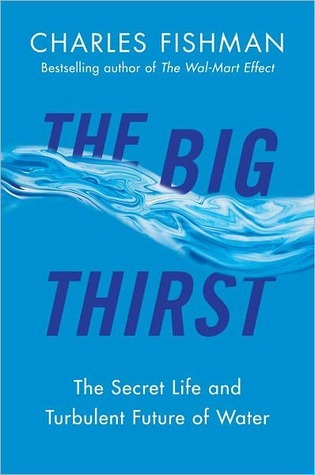
“Our water problems are real. Our approach to water must change, and we’ll be happier if we realize that, and handle the change with creativity and forethought rather than confront it as a crisis. It’s water we’re talking about, so there will be no avoiding the change. What we can choose is the time and the approach and the level of panic.”
“When conflict over water arises, typically, it’s not about the water itself, but about the role the water is playing, the use it’s being put to, who gets it and who doesn’t, and what condition the water is in when all is said and done.”
Fishman argues that whether we will avert or become embroiled in a water scarcity crisis is related more closely to our understanding, connection, and use of water—its management and economics—than its actual availability. Using Las Vegas, Australia, and India as case studies, Fishman highlights the pervasive significance of water in our lives and informs the reader of the social, economic, and technological solutions for better water distribution that are out there.
The Secret Knowledge of Water: Discovering the Essence of the American Desert
Categories: Water
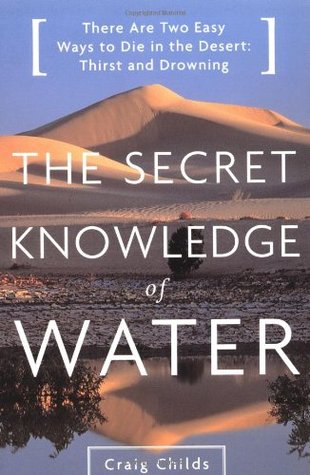
“To say that the desert has no water is a tantalizing misstatement. It is believable. But to look over this raven land and know the truth—that there is immeasurable water tucked and hidden and cared for by bowls of rock, by sudden storms, by artwork chiseled hundreds and thousands of years ago—is by far a greater pleasure and mystery than to think of it as dry and senseless as wadded newspaper. It is not only drought that makes this a desert; it is all the water that cannot be seen.”
“Every move this small flood made was original. Every stone came as news. But what impressed me was that it took up residence without deliberation. It immediately knew how to turn behind a boulder, how to run straight down a chute and then wind like a stirred pot below, as if it had been here for a thousand years. It read the world as quickly as it could move.”
Childs takes readers on a journey throughout the deserts and cactus forests of the American Southwest—from the Grand Canyon to the Sonoran Desert and more—in search of that element deserts are seemingly defined in the negative against: water. He seeks in out in the form of creeks, springs, waterholes, thunderstorms, and flash floods, recounting his adventures with insight gleaned from anthropologists, environmental scientists, ranchers, Native American stories, and previous desert explorers and immigrants.
The Earth Is Enough: Growing Up in a World of Flyfishing, Trout & Old Men
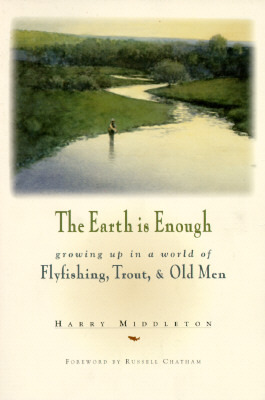
“The land was theirs, free and clear, and they had evidently made a decision decades before to keep it the way it was, to work with it rather than against it. A decision for trout and quail instead of beans. It seemed to them the world had too many beans and too few trout and wild turkeys. Their life in the mountains became a compromise, a balance of giving and taking.”
In 1956, Middleton, at 14 years of age, was placed under the care of his grandfather and his great-uncle and their Sioux neighbor on their farm in the Ozark Mountains in north Arkansas. Under their tutelage, he gets an education in fly-fishing, 19th-century farming, and simple living, and most importantly, a respect for the wild earth. It’s a pleasure to get to know the eccentric and wise characters of Middleton’s boyhood, and the place they are loyally devoted to.
Arctic Dreams
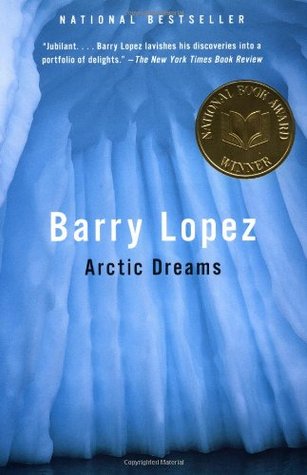
“No culture has yet solved the dilemma each has faced with the growth of a conscious mind: how to live a moral and compassionate existence when one is fully aware of the blood, the horror inherent in all life, when one finds darkness not only in one’s own culture but within oneself.”
“What does it mean to grow rich?
Is it to have red-blooded adventures and to make a ‘fortune,’ which is what brought the whalers and other entrepreneurs north?
Or is it, rather, to have a good family life and to be imbued with a far-reaching and intimate knowledge of one’s homeland, which is what the Tununirmiut told the whalers at Pond’s Bay wealth was?
Is it to retain a capacity for awe and astonishment in our lives, to continue to hunger after what is genuine and worthy? Is it to live at moral peace with the universe?”
In his National Book Award-winning book, Lopez shows the reader how wealthy he is in the latter category. Here is a man who is truly in touch with where he is—the Arctic—culturally, historically, scientifically, emotionally, and spiritually. He meticulously and reverentially examines the Far North from every angle, studying how a place can gets under our skin and inform our own human nature.
Pilgrim at Tinker Creek
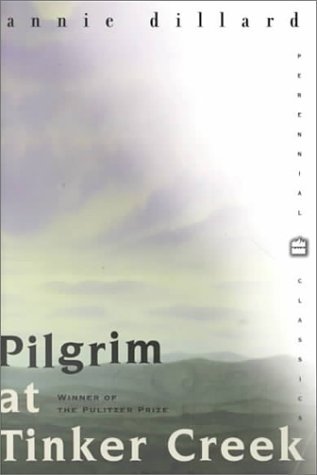
“The answer must be, I think, that beauty and grace are performed whether or not we will or sense them. The least we can do is try to be there.”
“I am no scientist. I explore the neighborhood…It is my leisure as well as my work, a game…I walk out; I see something, some event that would otherwise have been utterly missed and lost; or something sees me, some enormous power brushes me with its clean wing, and I resound like a beaten bell.”
In this Pulitzer-prize winning book, Dillard takes us with her on her explorations throughout the Tinker Creek valley in Virginia’s Blue Ridge range over the course of a year’s seasons. She writes lucidly about her engagements with her environment and the variety of beings within it, as well as meditations on presence, transience, mortality, fertility, perception, and the divine. It’s a treat to spend time with someone who knows where they live so well, and who can tell you about it with such strikingly visionary writing.
The Island Within
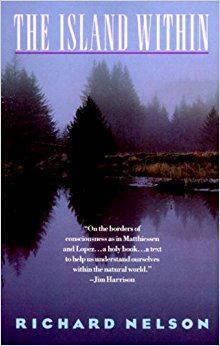
“I’ve often thought of the forest as a living cathedral, but this might diminish what it truly is. If I have understood Koyukon teachings, the forest is not merely an expression or representation of sacredness, nor a place to invoke the sacred; the forest is sacredness itself.”
“[I breathe in the] air that has passed continually through life on earth…pass it on, share it in equal measure with billions of other living things, endlessly, infinitely.”
In essays spanning the course of a hunter’s year, Nelson, an anthropologist who studies indigenous cultures of Alaska, describes his attempt to live off the land on an island off of the coast of southeast Alaska and forge a deeper relationship to both its minute parts—puffins, otters, whales—and its dazzling, sacred whole. He writes beautifully about “[claiming]” and “being claimed by” the island, a “place that wholly engages the heart and mind.”
Tom Brown’s Field Guide to Nature Observation and Tracking
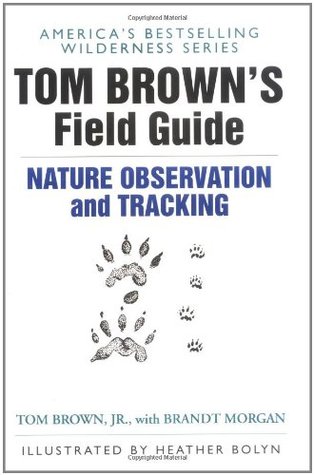
“This earth is a garden, this life a banquet, and it’s time we realized that it was given to all life, animal and man, to enjoy.”
Drawing on his childhood lessons on tracking, survival skills, and spirituality from a Lipan Apache elder and his experiences finding fugitives and missing persons, Brown teaches readers how to restore and develop our five senses to enter into a deeper relationship with nature, and how to track animals (including humans). Includes illustrations by Heather Bolyn.
Wilderness and the American Mind: Fifth Edition
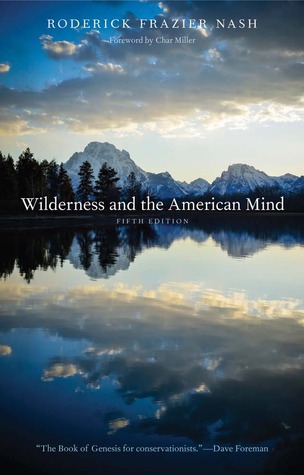
“Wilderness is a state of mind…not so much what wilderness is but what men think it is.”
Through history, politics, economics, and philosophy Nash captures (primarily white male city-dwelling) Americans’ relationship to nature in the United States of America since the country’s founding through the modern day. It traces the history of the environmental conservation/preservation movement and how we’ve come from fearing an overwhelming wilderness to now regarding it as a scarce national commodity and intellectual (and spiritual) concept. Though the perspective is narrowly focused and the writing sometimes academic to the point of dryness, it’s been described as “the Book of Genesis for conservationists” for a good reason: it’s possibly the best overview of American environmental history and represents a career’s worth of study, updated through five editions.
The Snow Leopard
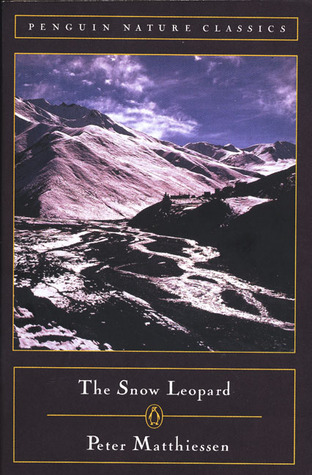
“The secret of the mountain is that the mountains simply exist, as I do myself: the mountains exist simply, which I do not. The mountains have no “meaning,” they are meaning; the mountains are. The sun is round. I ring with life, and the mountains ring, and when I can hear it, there is a ringing that we share. I understand all this, not in my mind but in my heart, knowing how meaningless it is to try to capture what cannot be expressed, knowing that mere words will remain when I read it all again, another day.”
In the winter of 1973, Mathhiessen accompanied his field biologist friend George Schaller on a five-week expedition and spiritual pilgrimage in Nepal’s Himalayan mountains to study blue sheep, though he was more interested in catching a glimpse of the sheep’s predator: the elusive, mystical snow leopard. Mathhiessen writes precisely and beautifully (though a bit densely) about Zen and Tibetan Buddhist teachings, especially emptiness, impermanence, and acceptance, as he finds a way through his grief for his late wife. (The Snow Leopard won the National Book Award in two categories 1979 and 1980.)
The Practice of the Wild
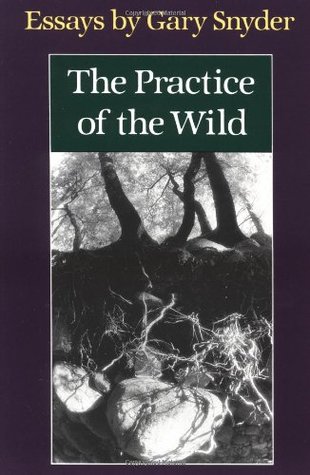
Read here
“I hope to investigate the meaning of wild and how it connects with free and what one would want to do with these meanings. To be truly free one must take on the basic conditions as they are—painful, impermanent, open, imperfect—and then be grateful for impermanence and the freedom it grants us. For in a fixed universe there would be no freedom. With that freedom we improve the campsite, teach children, oust tyrants. The world is nature, and in the long run inevitably wild, because the wild, as the process and essence of nature, is also an ordering of impermanence.”
“Nature is not a place to visit, it is home—and within that home territory there are more familiar and less familiar places. Often there are areas that are difficult and remote, but all are known and even named.”
In nine essays, the poet, environmentalist, and social critic Gary Snyder, described as “the laureate of Deep Ecology,” draws on his understanding of Zen Buddhist & Daoist teachings, Native American mythology, and his personal relationships to place as a logger and conservationist to interrogate what wildness really means how we can recognize and restore it in the world and in ourselves. But primarily, this is not a book about environmental activism; it is a book asking what it means to be human in a world that is rapidly changing. Where the wild used to mean home and source of life, it now means playground and escape.
Into the Wild
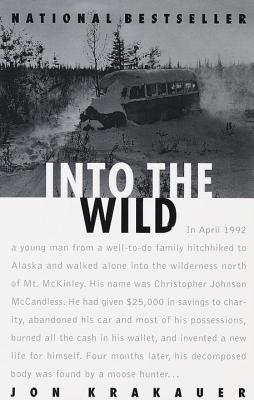
“So many people live within unhappy circumstances and yet will not take the initiative to change their situation because they are conditioned to a life of security, conformity, and conservation, all of which may appear to give one peace of mind, but in reality nothing is more damaging to the adventurous spirit within a man than a secure future. The very basic core of a man’s living spirit is his passion for adventure.”
“You are wrong if you think Joy emanates only or principally from human relationships. God has placed it all around us. It is in everything and anything we might experience. We just have to have the courage to turn against our habitual lifestyle and engage in unconventional living.”
“Mountains make poor receptacles for dreams.”
In the spirit of London, Muir, and Thoreau, in 1992 an idealistic college graduate, Chris McCandless, left behind his home, family, belongings, and money—society as he knew it—to “wallow in the raw, unfiltered experiences” of the Alaskan wilderness. At first his odyssey seems inspiring and righteous. But then he dies, a mere four months after he left home. Krakauer (author of Into Thin Air about an Everest expedition gone horribly wrong) describes McCandless’ story and lets us decide: was McCandless a philosopher rejecting the ills of materialistic society to live a more meaningful life, becoming a martyr in the process? Or merely an inconsiderate and ill-prepared young man, the tragic victim in a cautionary tale against stubborn independence and idealism to the point of delusion?
A Sand County Almanac
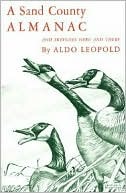
“Cease being intimidated by the argument that a right action is impossible because it does not yield maximum profits, or that a wrong action is to be condoned because it pays.”
“Conservation is getting nowhere because it is incomprehensible with our Abrahamic concept of land. We abuse land because we regard it as a commodity belonging to us. When we see land as a community to which we belong, we may begin to use it with love and respect. There is no other way for land to survive the impact of the mechanized man, nor for us to reap from it the esthetic harvest it is capable, under science, of contributing to culture. That land is a community is the basic concept of ecology, but that land is to be loved and respected is an extension of ethics. That land yields a cultural harvest is a fact long known, but latterly often forgotten…perhaps such a shift of values can be achieved by reappraising things unnatural, tame and confined in terms of things natural, wild, and free.”
In a series of essays in three parts, Leopold describes the “delights and dilemmas of one who cannot [live without wild things].” As a part-time farmer who works to make a home out of of an overexploited and abandoned farm in Sand County, Wisconsin, he is intimate with those delights and dilemmas. In part one, he sharply, lovingly observes the farm and its minute changes throughout the seasons: from the geese he admires to the partridge he hunts. In part two, he describes conservation issues affecting a variety of places scattered throughout North America. In part three, he expresses his grief at America’s current (at the time of writing) relationship with nature and what might be done to restore a healthy, compassionate relationship and land ethic. Throughout the book are lovely illustrations drawn by Charles W. Schultz.
The Abstract Wild
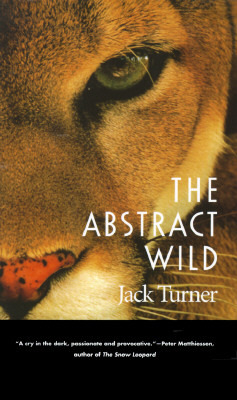
“Those early visits to the Maze, Glen Canyon, and the Escalante led me to the margins of the modern world, areas wild in the sense Thoreau meant when he said that in wildness is the preservation of the world: places where the land, the flora and fauna, the people, their culture, their language and arts were still ordered by energies and interests fundamentally their own, not by the homogenization and normalization of modern life.”
“[Wildness is] the relation of free, self-willed, and self-determinate ‘things’ with the harmonious order of the cosmos.”
“Something vast and old is vanishing and our rage should mirror that loss.”
In a collection of eight essays, Turner examines the questions: “how wild is wilderness and how wild are our experiences in it?” He argues—angrily, unapologetically—that the threats to wilderness have their root in six harmful abstract values and mindsets that shape our modern character and culture: 1) “our diminished personal experience of nature,” 2) “our preference for artifice,” 3) “our…dependence on experts to control and manipulate a natural world we no longer know,” 4) “our addiction to economics, recreation, and amusement at the expense of other values,” 5) a Western homogeneity and monoculture of biology, culture, language, thought, and social structures, and 6) an ignorance of or refusal to recognize the catastrophic loss of our “several-million-year-old intimacy with the natural world.” He calls for a change in character and in culture so we can reunited with the “life-force,” reborn as champions who confront the abstractions that keep the wild abstract from us.
Walden

“The cost of a thing is the amount of what I will call life which is required to be exchanged for it, immediately or in the long run.”
“Live in each season as it passes; breathe the air, drink the drink, taste the fruit, and resign yourself to the influence of the earth.”
“I went to the woods because I wished to live deliberately, to front only the essential facts of life, and see if I could not learn what it had to teach, and not, when I came to die, discover that I had not lived. I did not wish to live what was not life, living is so dear; nor did I wish to practice resignation, unless it was quite necessary. I wanted to live deep and suck out all the marrow of life, to live so sturdily and Spartan-like as to put to rout all that was not life, to cut a broad swath and shave close, to drive life into a corner, and reduce it to its lowest terms, and, if it proved to be mean, why then to get the whole and genuine meanness of it, and publish its meanness to the world; or if it were sublime, to know it by experience, and be able to give a true account of it in my next excursion.”
What would happen if you left your (sub)urban life as you knew it to live in the woods? Walden Pond is one man’s answer. In the mid 1800’s American Transcendentalist Henry David Thoreau undertook an experiment to live for two years, two months, and two days as simply and self-sufficiently as possible in a cabin in the woods by Walden Pond outside of Concord, Massachusetts. He looks both outward and inward as he details and opines on his natural surroundings, farm and maintenance work, society, spirituality, literature, and human nature.
The Only Kayak
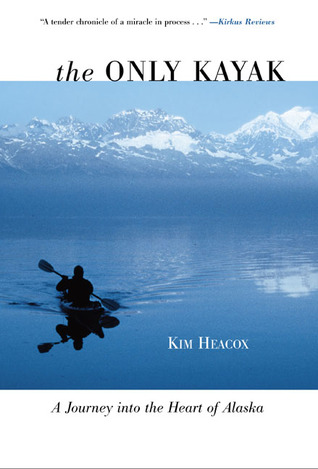
“Wilderness areas are places to explore deeply yet lightly; to exercise freedom but also restraint, to manage but also leave alone, to bring us face-to-face with a dilemma in our democracy. How do we convince people to save something they may never see, touch, or hear? A starving man can’t eat his illusions, let alone his principles.”
“I live in the sunlight of friends and the shadows of glaciers.” So begins Kim Heacox’s weave of memoir, history, and conservation treatise on living in Glacier Bay, Alaska, a place where the myth of the “Last Frontier” still feels alive. His love for Glacier Bay, Alaska, was first ignited when he worked there as a park ranger in the late 1970’s, and developed as he built a life there over the next 25-odd years. He becomes determined to conserve such wilderness, and wrestles with the paradoxes of loving a place that is rapidly disappearing, and sharing that love when recreating there seems to make Glacier Bay more vulnerable to overdevelopment. With humor and thoughtfulness Heacox captures the spectrum of relationships we have to nature and with each other.
Desert Solitaire
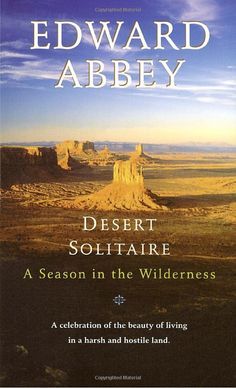
“Wilderness. The word itself is music.”
“A man could be a lover and defender of the wilderness without ever in his lifetime leaving the boundaries of asphalt, powerlines, and right-angled surfaces. We need wilderness whether or not we ever set foot in it. We need a refuge even though we may never need to set foot in it. We need the possibility of escape as surely as we need hope; without it the life of the cities would drive all men into crime or drugs or psychoanalysis.”
In Desert Solitaire Edward Abbey, the author of the iconic novel The Monkey Wrench Gang (about the shenanigans of anarchist environmentalists as they battle industrial development) reflects on his time as a ranger throughout three seasons in Arches National Park in southeastern Utah. With a writing voice that’s both beautiful and fiery in turns, he details the hardships and rewards of living in “nature in its purest form.” Desert Solitaire is also an impassioned call to nature-lovers to protect such places from being exploited by oil, mining, and tourism industries.
On The Loose
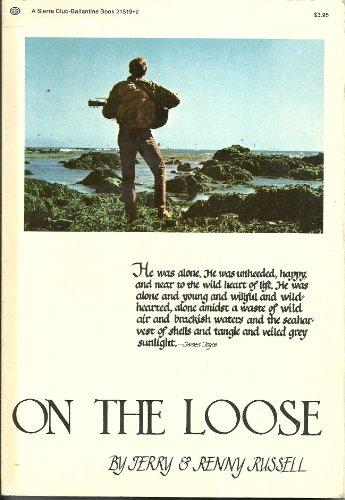
“We live in a house that God built but that the former tenants remodelled–blew up, it looks like–before we arrived. Poking through the rubble in our odd hours, we’ve found the corners that were spared and have hidden in them as much as we could. Not to escape from but to escape to: not to forget but to remember.”
“It feels good to say ‘I know the Sierra’ or ‘I know Point Reyes.’ But of course you don’t—what you know better is yourself, and Point Reyes and the Sierra have helped.”
On The Loose is a memoir that recounts the adventures of authors Renny and his brother Terry as they journey together throughout the American West in the 1950s and ‘60s. An inspiring book about how self-knowledge can be gained through exploring and revering wild places in the precious time before they are destroyed. (Fun fact: Terry was 21 and Renny was 19 when they wrote the book.) It also includes original photographs from their travels through famous wilderness areas such as Yosemite and Glen Canyon.





























































